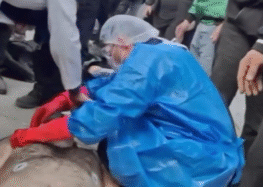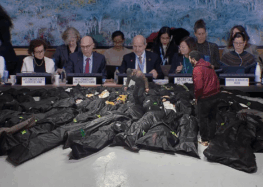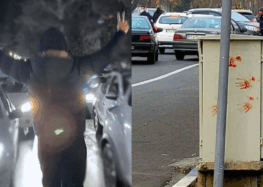Concern about Moharebeh Charges against members of the Committee of Human Rights Reporters
The Committee of Human Rights Reporters is an Iranian civil society organization that has faced immense pressure through arrests of its members after the June 2009 Iranian presidential elections. Iranian security and judicial authorities are currently posing very serious charges against this group and there is concern that some of the organization’s members might face heresey (“moharebeh”) charges. Members of the organization told the International Campaign for Human Rights in Iran that the stated charges are unfounded and only waged to stop this young civil organization.
The Committee of Human Rights Reporters was established in March 2005, by a group of social and student activists who were interested in documenting human rights violations. Their credo states: “This Committee is an independent organization and is not related to any party or political group and lacks political identity.”
The civil entity’s Web site is comprised of different sections such as children, women, political prisoners, society, and universities and the Web site’s contents are represented in the form of statements, reports, announcements, and articles. As stated in the Committee’s credo, members of the organization have followed the mission of “informing” and “public opinion enlightenment” in the area of violations of human rights. While documenting violations of human rights violations in Iran has always had its own risks, the post-elections arrests resulted in unprecedented pressure in this area.
One of the Committee members who was arrested twice after the elections is Shiva Nazar Ahari, who was first arrested on June 14, 2009. After spending 102 days in prison, she was released from Evin prison on a $200,000 bail on September 23, 2009. She spent 33 days of her detention in solitary confinement. Nazar Ahari was arrested again on December 20, 2009, along with Kouhyar Goudarzi and Saeed Haeri, two other members of the group. On December 20, 2009, a bus containing civil and political activists heading for Ayatollah Montazeri’s funeral in Qom was stopped in Tehran’s Enghelab Square by security forces and from among all passengers, only the three members of the Commitee and a women’s rights activist, Mahboubeh Abbasgholizadeh, were arrested. Abbasgholizadeh was released the next day.
On November 20, 2009, Saeed Jalalifar and Saeed Kalanaki, two other members of the group were arrested. On November 21, 2009, Saeed Hababi, another member and a student activist who had been summoned to the Ministry of Intelligence’s Follow-Up Unit was interrogated and threatened.
On January 1, 2010, four members of the Committee were summoned by phone to Ministry of Intelligence’s Follow-Up Unit. The interrogator informed them that they were summoned for arrest. Of the four members, Parisa Kakaee and Mehrdad Rahimi were arrested at 8:30 p.m. on that day after they appeared at the Follow-Up Unit. Parisa Kakaee was released on February 17, 2010. Committee members told the International Campaign for Human Rights in Iran that prior to her arrest, Parisa Kakaee had received numerous threatening telephone calls from security organizations. During one of these phone calls to two Committee members, Shiva Nazar Ahari, Saeed Kalanaki, and Saeed Jalalifar asked for the Web site to be shut down, after which the interrogator took the phone and threatened the Committee members, stating that if the Web site is not shut down other Committee members would be arrested.
On January 1, 2010, Saeed Habibi and Hessam Missaghi, two other Committee members were summoned to Ministry of Intelligence’s Follow-Up Unit. They did not oblige, but during further phone calls they were threatened by the case officer.
On February 7, 2010, another Committee member, Ali Kalaee was arrested. He was released on February 14, 2010. Kalaee had been arrested previously on May 10, 2009 and released on July 1, 2009.
On the evening of March 2, 2010, another Committee member, Navid Khanjani was arrested in Isfahan after security forces went to his home. Also, on the morning of March 3, 2010, security forces went to the homes of Hessam Missaghi and Sepehr Atefi, searching the premises and confiscating their personal items but were unable to arrest the two members as they were not at home during the raid.
In late March, four imprisoned members of the Committee, Saeed Kalanaki, Saeed Jalalifar, Mehrdad Rahimi, and Saeed Haeri, were released from Evin prison on $100,000 bails. Currently, three members of the Committee of Human Rights Reporters, Shiva Nazar Ahari, Kouhyar Goudarzi, and Navid Khanjani, remain in Evin prison.
Pressure on Committee members inside Evin Prison
Committee members told the International Campaign for Human Rights in Iran that during her second imprisonment in Evin prison, which started on December 20, 2009, Shiva Nazar Ahari has spent more than 60 days in solitary confinement and several days in a very small solitary confinement cell “like a cage.” During her interrogations, she has been threatened with execution several times and her case interrogator has asked the judge for maximum punishment for her.
A Committee member told the International Campaign for Human Rights in Iran: “All detained members of the Committee have been under immense pressure during their interrogations to agree to televised confessions, facing charges such as “relations with the Mujahedin Khalgh Organization” and “moharebeh.”
According to Committee members, Navid Khanjani, who was arrested during the sweeping arrests of human rights activists is currently in an IRGC solitary confinement cell, under interrogation and immense pressure.
Kouhyar Goudarzi, who was expelled from Sharif Industrial University last November, was seen at Evin prison with a bandaged head. He is under high pressure to accept his charges.
Refuting all charges such as relations between the Committee and regime opposition groups, Committee members have denied any relations with political groups inside or outside the country, calling charges brought by security and judicial authorities fabricated. In a statement issued by the Committee, which addresses the charges made against its members, charges such as “Committee’s relations with Mujahedin Khalgh Organization through information analysts,” have been called “tools for setting the scene to physically eliminate” the organization.
In this statement, the Committee of Human Rights Reporters has objected to the charges made against its members, saying: “Despite explicit language of a resolution approved by General Assembly in December 1998, entitled “……………..” groups and social organizations are encouraged to promote and support human rights and basic rights recognized internationally which are expressed in multiple articles such as 10, 11, and 18, permitting and even holding responsible all people to organized human rights promotion, the Iranian government sees human rights organizations as manifestations of propagation against the regime through formation of illegal groups, putting pressure such as imprisonment, torture, etc., on human rights activists on this pretext. This irresponsible and immoral method is in conflict with all humane principles, recently employed by security organizations to confront human rights organizations including the Committee of Human Rights Reporters.”






